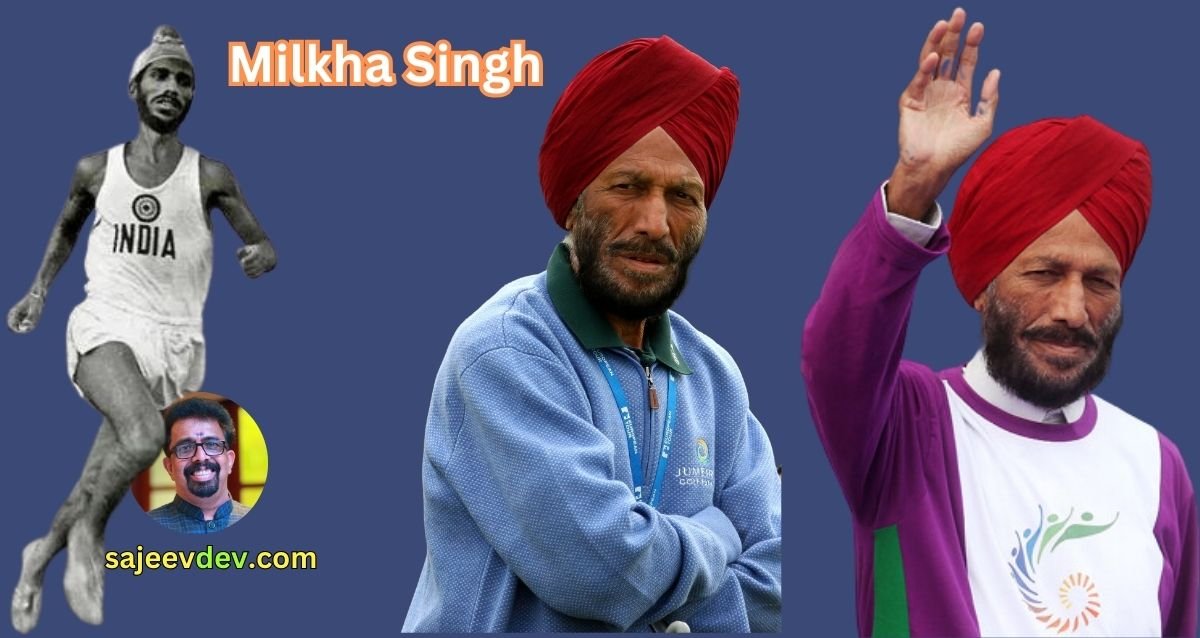Early Life and Struggles
Milkha Singh was born on November 20, 1929, in Govindpura, a town that was part of British India and is now in present-day Pakistan. His early life was deeply scarred by the partition of India in 1947. This tumultuous period in history was marked by extensive violence and mass migrations, and Milkha’s family was not spared. He witnessed the brutal killing of his parents and several siblings in the chaos, an event that left an indelible mark on his young life. In the midst of this upheaval and loss, Milkha was compelled to flee to India to save his own life.
After seeking refuge in Delhi, Milkha’s journey continued to be riddled with adversities. Survival was a daily struggle. Among many challenges, he had to grapple with the fundamental need for food and shelter. He resided in refugee camps and a resettlement colony, where life was harsh and uncertain. Hunger and poverty were his constant companions. On one desperate occasion, he was jailed for traveling without a ticket, an event epitomizing the precariousness of his situation.
Despite these hardships, Milkha Singh’s early experiences forged a formidable resilience within him. These profound challenges during his formative years laid the groundwork for an inner strength that would become a hallmark of his athletic career. Overcoming the monumental trauma of partition, Milkha honed his determination and disciplined himself to rise above his circumstances. His early life, marked by loss, displacement, and struggle, ultimately became the crucible in which his indomitable spirit was shaped.
These trials were the backdrop against which Milkha Singh’s future accomplishments were set. The endurance he developed during these testing times would propel him to become one of India’s most lauded athletes, inspiring generations with his story of perseverance and triumph against all odds.
The Birth of the Flying Sikh
Milkha Singh’s illustrious journey into the world of athletics commenced after he enlisted in the Indian Army in 1951. It was within this disciplined environment that Singh’s extraordinary sprinting abilities were first noticed. His talent was coupled with an unparalleled work ethic, driving him to train with unrelenting fervor. Running on the scorching sands of Rajasthan, Singh pushed his physical and mental boundaries, forging a path that would eventually lead him to greatness.
His rigorous training regimen included intense sessions that not only sculpted his physique but also instilled a sense of resolve and resilience. The disciplined schedule ingrained in him by the army played a pivotal role in his development as an elite athlete. His commitment to perfecting his craft was unwavering, setting the foundation for what would become an iconic career in athletics.
Singh’s hard work and dedication soon began to yield spectacular results. He emerged as a leading competitor in national competitions, consistently outperforming his peers. His speed and endurance on the track were unmatched, earning him the title of the fastest man in India. These early triumphs were instrumental in building his confidence and ambition to compete at an international level. The national acclaim he received not only boosted his morale but also highlighted his potential to leave a lasting legacy in the global athletic arena.
Recognized for his sprinting prowess, Milkha Singh’s ambitions extended far beyond local victories. This period marked the birth of the “Flying Sikh,” a moniker that would follow him throughout his career, symbolizing his speed, skill, and indomitable spirit. As he continued to break records and exceed expectations, it became evident that his destiny lay on the international stage, where he would go on to make history.
International Success and the Rome Olympics
Milkha Singh’s international career began to flourish when he represented India at the 1956 Melbourne Olympics. Although he did not secure a medal at these Games, the exposure provided a pivotal learning experience, igniting his resolve to excel on the world stage. The determination and lessons gained from Melbourne set the stage for an era of remarkable achievements.
The year 1958 was a turning point in Singh’s career when he made history at the Commonwealth Games in Cardiff, Wales. Competing against some of the best athletes from around the world, he clinched gold medals in both the 200m and 400m races. Milkha Singh’s triumph not only elevated his status internationally but also marked him as the first Indian to ever win a gold medal in athletics at the Commonwealth Games. This significant achievement captured the imagination of sports enthusiasts in India and bolstered national pride.
Building on his Commonwealth success, Milkha Singh set his sights on the 1960 Rome Olympics, where he competed in the 400m event. In a race that would go down in history, he narrowly missed a podium finish, securing fourth place with an impressive time of 45.6 seconds. This time would stand as a national record for almost four decades, underpinning his enduring legacy in Indian athletics.
While the narrow miss at the 1960 Rome Olympics was a moment of palpable disappointment, it highlighted Milkha Singh’s tenacity and exceptional talent. His fourth-place finish remains one of the most memorable performances in Indian Olympic history, illustrating his indomitable spirit and skill. Milkha Singh’s achievements during this period not only exemplify personal triumph but also signify a broader narrative of hope, resilience, and aspiration for Indian sports.
The Legend of the Flying Sikh
Milkha Singh’s extraordinary achievements in the world of athletics have rightfully earned him the moniker “The Flying Sikh.” This nickname was conferred upon him by General Ayub Khan, the then-President of Pakistan, following Singh’s remarkable victory in a race held in Pakistan in 1960. This was not merely a symbolic gesture but rather a testament to his unparalleled speed and unwavering determination to overcome significant hurdles.
The title “The Flying Sikh” encapsulates the essence of Singh’s athletic prowess and his ability to rise above not just physical challenges but metaphorical ones as well. Emerging from a tumultuous and tragic childhood during the Partition of India, his journey to becoming an athletics icon is a beacon of hope and resilience. He trained tirelessly, pushing beyond his limits, which rapidly elevated him to the pinnacle of Indian athletics.
Singh’s accomplishments brought him to the forefront on multiple prestigious platforms. One of the most notable moments was his performance in the 1960 Rome Olympics, where he narrowly missed out on an Olympic medal, securing fourth place in the 400 meters final. Although he did not win, his record-breaking run was lauded worldwide. His speed on the track translated into inspiration off it, motivating countless young athletes across India.
Moreover, the nickname “The Flying Sikh” has endured in the collective memory of not just Indian sports but also the global athletics community. It signifies not only Singh’s athletic brilliance but also the spirit of perseverance and excellence. His legacy continues to inspire, reminding future generations of the heights that can be reached through dedication, hard work, and unwavering resolve. Through his life and achievements, Milkha Singh remains an enduring symbol of excellence and resilience in Indian athletics.
Later Life and Legacy
After retiring from competitive athletics, Milkha Singh dedicated his life to fostering the growth of sports in India. He took up the role of Director of Sports in Punjab, where he worked tirelessly to develop and promote athletic programs across the state. His commitment to nurturing young talent reflected his deep passion for sports and his belief in the potential of India’s youth.
Milkha Singh’s life story, marked by extraordinary challenges and triumphs, has been a source of inspiration for countless individuals. His journey from a village boy who faced immense hardships to becoming a legendary athlete is a testament to his unwavering determination and resilience. His autobiography, The Race of My Life, co-authored with his daughter Sonia Sanwalka, was published in 2013. The book provides a poignant recount of his life’s highs and lows, giving readers an intimate glimpse into the making of the ‘Flying Sikh.’
The autobiography was subsequently adapted into the Bollywood film Bhaag Milkha Bhaag, directed by Rakeysh Omprakash Mehra and starring Farhan Akhtar in the titular role. The movie was a resounding success, captivating audiences and critics alike. Through the cinematic portrayal of his life, Milkha Singh’s incredible journey reached a new generation, ensuring that his legacy continues to inspire. The film not only celebrated his athletic achievements but also highlighted his personal struggles and the spirit that defined him as a sportsman and a human being.
Milkha Singh’s contributions to Indian athletics and his inspirational life story have left an indelible mark on the nation. His legacy is not just that of a great athlete, but also of a pioneer who showed the way for future generations of Indian sportspeople. His life and achievements continue to resonate, exemplifying the profound impact one individual can have on the sports culture of a nation.
Personal Life and Honors
Milkha Singh, renowned as the “Flying Sikh,” was not only an athletic legend but also a family man. In his personal life, Singh married Nirmal Kaur, who was the esteemed captain of the Indian women’s volleyball team. Their union was a blend of athletic brilliance, resulting in a family of high achievers. The couple had four children, including Jeev Milkha Singh, who followed in his father’s footsteps as a professional in sports, albeit in a different field. Jeev carved a name for himself in the world of golf, becoming a celebrated professional golfer and continuing the family legacy of sporting excellence.
Throughout his illustrious career and beyond, Milkha Singh received numerous accolades that acknowledged his significant contributions to Indian sports. In 1959, he was honored with the Padma Shri, one of India’s highest civilian awards. This recognition standing prominently among Singh’s numerous accomplishments, was a testament to his dedication, perseverance, and exceptional performance in athletics. His story and achievements remain an inspiration to many aspiring athletes across generations.
Singh’s honors were not confined to just titles and awards. His life and career inspired an entire nation, leaving a legacy that transcends athletic records. Public and private educational, sports institutions, and various organizations have sought to model their values on the principles Singh exemplified. Such was his impact that his life and achievements were immortalized in the film “Bhaag Milkha Bhaag,” bringing his heroic journey to the forefront of popular culture and ensuring that his contributions to Indian athletics were celebrated widely.
Milkha Singh stood as a paragon of hard work and unyielding spirit. His personal life, decorated with familial love and professional dedication, combined with the accolades he garnered throughout his career, affirms his lasting influence and the honor in his title as the legendary “Flying Sikh.”
A Legacy That Endures
Milkha Singh passed away on June 18, 2021, leaving behind an indelible legacy that continues to resonate across the world. His life story, marked by a relentless pursuit of excellence and an unyielding spirit, stands as a monument to determination and perseverance. Singh’s ability to transcend the trials of partition and rise to athletic prominence serves as a powerful inspiration to countless individuals.
Often revered as the “Flying Sikh,” Milkha Singh’s unparalleled achievements in athletics firmly etched his name in the annals of Indian sports history. Yet, his legacy extends far beyond his remarkable records and international acclaim. Milkha Singh epitomized the virtues of resilience and hope, qualities that continue to motivate athletes and non-athletes alike. His journey from a young boy ravaged by the violence of partition to a national icon is a testament to the enduring human spirit.
Singh’s impact on Indian sports is immense, as he paved the way for future generations to aspire and reach greater heights. His story is frequently recounted not only for its athletic merit but also for the underlying message of overcoming adversity. Milkha Singh has left an indomitable mark on the sporting landscape, ensuring that his contributions to Indian athletics will be remembered and celebrated for generations to come.
As we honor Milkha Singh’s legacy, it is crucial to reflect on the broader implications of his life and achievements. His embodiment of unwavering dedication and optimism serves as a guiding beacon for many. Milkha Singh’s legacy lives on, inspiring new generations to challenge themselves, push their boundaries, and believe in the face of adversity. Through his example, the “Flying Sikh” continues to inspire a nation and the world, proving that with grit and resolve, extraordinary feats are always within reach.
Milkha Singh’s Impact Beyond Sports
Milkha Singh’s story resonates far beyond the arena of sports. His journey is a testament to human resilience, illustrating how dedication and relentless pursuit of excellence can overcome life’s myriad challenges. Born in a turbulent period of India’s history, Singh’s early life hardships—fleeing from the horrors of the Partition, losing his family, and struggling to find stability—shaped his indomitable spirit. These experiences contributed to the formidable athlete he became, but more importantly, molded a man whose life became a beacon of hope and inspiration.
In the field of sports, Milkha Singh’s contributions have paved the way for future generations of Indian athletes. He broke barriers with his numerous accolades, including winning multiple gold medals in international competitions and setting enduring records. His performance, especially at the 1960 Olympics, where he narrowly missed a medal, remains etched in the annals of Indian sports history. For many young athletes, Milkha Singh is more than a legend; he is a role model whose life story motivates them to strive for excellence despite obstacles.
Beyond his athletic achievements, Milkha Singh’s life offers invaluable lessons on resilience and self-belief. His autobiography, “The Race of My Life,” co-authored by his daughter Sonia Sanwalka, provides insights into the challenges he faced and the ethos that drove him. His story has also been immortalized through the Bollywood film “Bhaag Milkha Bhaag,” bringing his inspirational journey to a wider audience. The film underscores the fact that mental strength and perseverance can lead to triumphs that go beyond physical capabilities.
Singh’s legacy, therefore, extends well beyond the track. It encompasses an all-encompassing spirit of striving amidst adversity, relentless perseverance, and unwavering dedication. These qualities resonate with people from all walks of life, making Milkha Singh a symbol of human triumph. His enduring influence is a powerful reminder of the impact one individual’s determination can have, not only in sports but in the broader struggles of life.









